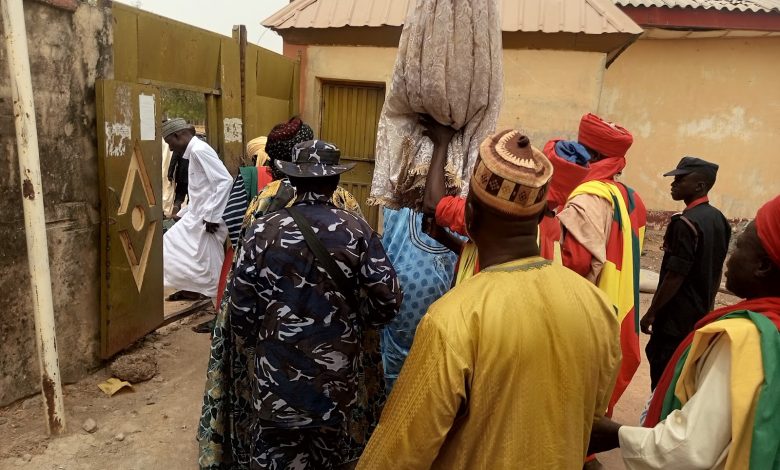Land Dispute, Community Resistance Blamed For Deadly Zamfara Attack
At least four people, including a retired senior official and a former local council chairman, have been killed and dozens abducted after armed groups launched a coordinated overnight assault on Morai town in Nigeria’s Zamfara State, in what residents claim was retaliation linked to a local land dispute and the town’s longstanding resistance to terrorist incursions.

At least four people were killed and dozens abducted when over 200 armed terrorists attacked Morai town in Talata-Mafara Local Government Area of Zamfara State, northwestern Nigeria, in the early hours of Tuesday, April 15.
The operation, which lasted nearly three hours, was carried out without any intervention from security forces reportedly present in the area.
The attackers stormed the community around 1:00 a.m. in three vehicles and over 50 motorcycles, spreading out across the town and overwhelming residents who were caught off guard. Among those killed was a retired senior civil servant and former chairman of the local government, Saminu Suleiman. Others included former councillor Akilu Liman and resident Shafiu Lauwali.
While the exact number of abducted persons remains unconfirmed, eyewitnesses say several residents were taken away in vehicles to Bayan Ruwa Dam in the neighbouring Maradun LGA.
“They left Morai with our neighbours loaded in a car and moved them to their camp,” Salisu Lawal, a trader in Morai who survived the attack, told HumAngle.
This latest assault came at a time when local vigilantes were off guard. The terrorists exploited the lull by combining motorcycles with vehicles, a strategy that allowed them to quietly breach the township without raising early suspicion, residents told HumAngle. No signs had indicated an imminent attack, making the operation particularly devastating.
“More than five armed marauders invaded our home, crossing over the fence,” he recounted. “They knocked on my doors, roaring and shouting at us to either open the doors or they would kill all of us. We are already familiar with that nonsense. We couldn’t get scared and refused even to utter a sound of presence in the house.”
Abdullahi Aminu, a local security source, believes the attack was a reprisal by armed groups from Bayan Ruwa camp, targeting Morai for its history of resisting terrorist incursions.
“They have formed a strong resistance, so much that the entire town once became impenetrable to them [terrorists] for quite a long time,” Abdullahi told HumAngle. “The terrorists have been forming several coalitions of attacks to crash Morai town because we have become a stumbling block to their mission to abduct, kill, and rustle.”
There are also reports linking the violence to a land dispute. Some sources allege that Fulani residents from the Jandutsi settlement in the area sought help from the armed group after claiming their grazing land had been allocated to non-Fulani farmers, a move they attributed to the local government chairman, Yahaya Yari Abubakar.
The chairman denied the accusations. “It is not true to say we confiscated grazing areas and changed them to plots or farms for or against some sections of the people,” Yahaya told HumAngle. “What we did was clear forested areas to improve visibility and enhance security throughout the local government area.”
At least four people were killed, including a retired senior civil servant and a former councillor, and dozens were abducted in Morai town, Zamfara State, Nigeria, when over 200 armed terrorists attacked in the early hours of Tuesday, April 15. The attack, lasting nearly three hours, occurred without intervention from local security forces.
The terrorists entered the town around 1:00 a.m. in vehicles and motorcycles, taking residents by surprise. Many were kidnapped and taken to the Bayan Ruwa Dam area in Maradun LGA. The attack might have been a reprisal linked to Morai's resistance against terrorist incursions and possibly a land dispute involving local Fulani residents and non-Fulani farmers. The local government chairman refuted claims of land confiscation, attributing previous land clearing to security enhancement efforts.
Support Our Journalism
There are millions of ordinary people affected by conflict in Africa whose stories are missing in the mainstream media. HumAngle is determined to tell those challenging and under-reported stories, hoping that the people impacted by these conflicts will find the safety and security they deserve.
To ensure that we continue to provide public service coverage, we have a small favour to ask you. We want you to be part of our journalistic endeavour by contributing a token to us.
Your donation will further promote a robust, free, and independent media.
Donate HereStay Closer To The Stories That Matter




